 W
WRowing is the act of propelling a boat using the motion of oars in the water by displacing water to propel the boat forward. Rowing and paddling are similar. However, rowing requires oars to have a mechanical connection with the boat, while paddles are hand-held and have no mechanical connection.
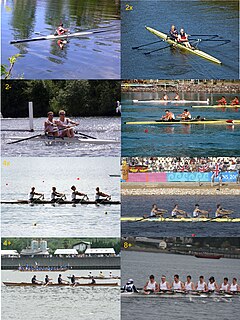 W
WRowing, sometimes referred to as Crew in the United States, is a sport whose origins reach back to Ancient Egyptian times. It involves propelling a boat on water using oars. By pushing against the water with oars, rowers generate force to move the boat. The sport can be either recreational for enjoyment or fitness, or competitive, when athletes race against one another in boats. The training and physical strain on the body required to be a successful rower is intense. A very tough mind and body is needed to succeed. There are several different boat classes in which athletes may compete, ranging from an individual shell to an eight-person shell with a coxswain.
 W
WIn rowing, the "bow" or sometimes "bows" of a boat is the forward part of the hull, the point that is most forward when the vessel is underway, otherwise known as the end of the boat. The other end of the boat is called the stern. The rower closest to the bow of the boat is also known as "bow".
 W
WCoastal and offshore rowing is a type of rowing performed at sea. Due to the harsher conditions encountered, the boats are wider and more robust than those used on rivers and lakes. In North America, this sport is often called open water rowing. Rowing Ireland is the only National Governing Body for all types of rowing in Ireland
 W
WA cox box is an electronic device used in competitive rowing that combines a digital stroke rate monitor and elapsed time readout with a voice amplifier. Although the term "cox box" is often used as a generic descriptor of this type of device, "Cox-Box", "CoxBox" and "Cox Box" are registered trademarks of Nielsen Kellerman, one of the several companies that manufacture this type of unit. Other brand names include CoxVox, CoxOrb, MiniAmp, CoxAmpPro, Coxmate SRT+, Coxmate SX which has a 10Hz GPS module to track boat speed. All deliver amplification of the coxswain's voice using a microphone and series of wired loudspeakers.
 W
WThe Heineken Roeivierkamp ('H4K') is an international rowing tournament that is held annually on the Amstel in Amsterdam in the second or third weekend of March. In four days four races are rowed, a day a long one and a short distance.
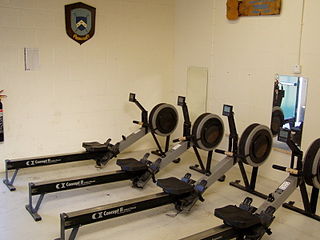 W
WAn indoor rower, or rowing machine, is a machine used to simulate the action of watercraft rowing for the purpose of exercise or training for rowing. Indoor rowing has become established as a sport in its own right. The term "indoor rower" also refers to a participant in this sport.
 W
WNouka Baich is a traditional dragon boat-style rowing sport of Bangladesh. The Bangladesh Rowing Federation, established in 1974, is the authority of all rowing activities in Bangladesh and has organised over 40 National Rowing Championships. The races are held during the wet and autumn seasons of the Bengali calendar which corresponds from June to October in the Gregorian calendar. The "Nowka Bais" which takes place annually in Birmingham is a leading cultural event in the West Midlands, United Kingdom attracting not only the Bangladeshi diaspora but a variety of cultures. It is also the largest kind of boat race in the United Kingdom.
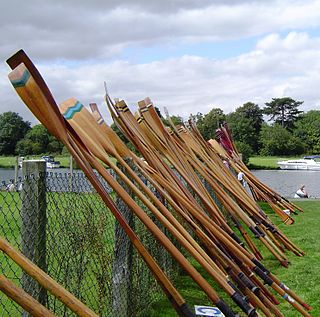 W
WAn oar is an implement used for water-borne propulsion. Oars have a flat blade at one end. Rowers grasp the oar at the other end.
 W
WIn rowing, oars are used to propel the boat. Oars differ from paddles in that they use a fixed or sliding fulcrum, an oarlock or rowlock attached to the side of the boat, to transfer power from the handle to the blade, rather than using the athlete's shoulders or hands as the pivot-point as in canoeing and kayaking.
 W
WOcean rowing is the sport of rowing across oceans. Some ocean rowing boats can hold as many as fourteen rowers; however, the most common ocean rowboats are designed for singles, doubles, and fours.
 W
WOn the Water is a 1998 novel by Dutch author Hans Maarten van den Brink. It recounts an unlikely sporting partnership which is shattered by the advent of World War II. The central roles are those of Anton and David, a rowing crew from opposite sides of Amsterdam society, and Doktor Schneiderhahn, the enigmatic German rowing coach who brings them together.
 W
WAn outrigger is a projecting structure on a boat, with specific meaning depending on types of vessel. Outriggers may also refer to legs on a wheeled vehicle that are folded out when it needs stabilization, for example on a crane that lifts heavy loads.
 W
WPararowing is a category of rowing race for those with physical, visual or intellectual disabilities.
 W
WRepechage is a practice in series competitions that allows participants who failed to meet qualifying standards by a small margin to continue to the next round. A well known example is the wild card system.
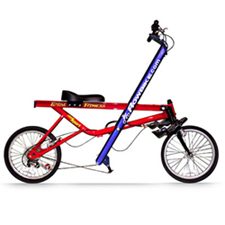 W
WA rowbike is an example of a rowing cycle, hybrid fitness/transport machine that combines a bicycle, and a rowing machine. "Rowbike" is a trademark of the Rowbike company. The Rowbike was invented by Scott Olson, the creator of Rollerblade inline skates. "Rowling" is a combination of rowing and rolling and is sometimes used in place of rowing when describing a Rowbike.
 W
WA rowing cycle is a wheeled vehicle propelled by a rowing motion of the body. Steering, braking, and shifting are usually done by the handlebars. Feet are on symmetrical foot rests, as opposed to rotating pedals. Unlike many rowing boats, the rider faces forward. Rowing cycles exist in numerous designs, particularly with respect to frames and drive mechanisms. Commercial production numbers for rowing cycles are small compared to that of standard bicycles.
 W
WA rowing tank is an indoor facility which attempts to mimic the conditions rowers face on open water.
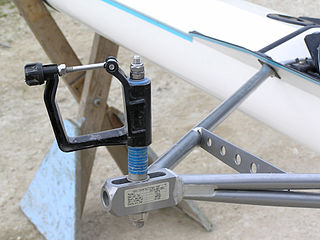 W
WA rowlock, sometimes spur, oarlock (USA) or gate, is a brace that attaches an oar to a boat. When a boat is rowed, the rowlock acts as a fulcrum, and, in doing so, the propulsive force that the rower exerts on the water with the oar is transferred to the boat by the thrust force exerted on the rowlock.
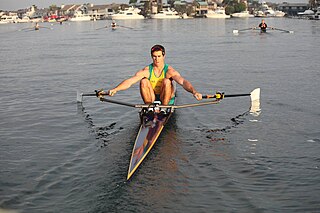 W
WSculling is the use of oars to propel a boat by moving the oars through the water on both sides of the craft, or moving a single oar over the stern. A long, narrow boat with a sliding seat and rigged with two oars per rower may be referred to as a scull, its oars may be referred to as sculls, and a person rowing it referred to as sculler.
 W
WSkiffing refers to the sporting and leisure activity of rowing a Thames skiff. A Thames skiff is a traditional hand built clinker-built wooden craft of a design which has been seen on the River Thames and other waterways in England and other countries for nearly 200 years. Sculling means propelling the boat with a pair of oars (blades) as opposed to rowing which requires both hands on a single oar.
 W
WStern sculling is the use of a single oar over the stern of a boat to propel it with side-to-side motions that create forward lift in the water. It is distinguished from sculling, which is rowing with two oars on either side of the boat and from sweep rowing, whereby each boat crew member employs a single oar, complemented by another crew member on the opposite side with an oar, usually with each pulling an oar with two hands.
 W
WIn rowing, stroke is the action of propelling the boat with oars, and also a rower seated closest to the stern of the boat. The stroke side is the port side of the boat.
 W
WSweep or sweep-oar rowing is a type of rowing when a rower has one oar, usually held with both hands. As each rower has only one oar, the rowers have to be paired so that there is an oar on each side of the boat. This is in contrast to sculling when a rower has two oars, one in each hand. In the UK the term is less used as the term rowing generally refers to sweep oar. The term pulling was also used historically.
 W
WThrough Hell and High Water is a BBC television programme produced by Twofour that aired in the United Kingdom on 13 – 17 February 2006. Five half-hour morning programmes on BBC1 followed James Cracknell and Ben Fogle in their attempt to cross the Atlantic Ocean in "Spirit of EDF Energy", a 24-foot rowing boat, with a half-hour summary programme during the evening of the final day on BBC2.